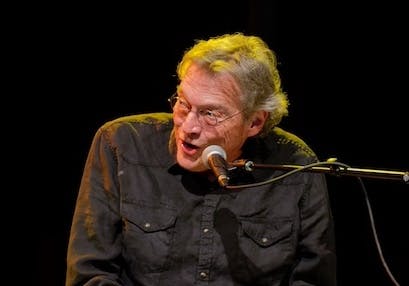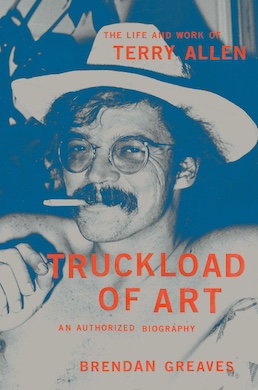Terry Allen Sits at Intersection of Country Music and the Art Scene: Think Hank Williams and Marcel Duchamp
Allen and his biographer have collaborated on a series of projects, not least of which is a remastered version of ‘Lubbock (On Everything),’ rightfully considered an alt-country masterwork.

‘Truckload of Art: The Life and Work of Terry Allen’
By Brendan Greaves
Hatchette Books
Cultural conflagrations don’t come any less expected than those that mark the life and career of Terry Allen: the orbits of country music and the art scene don’t, after all, tend to travel the same paths. Still, here we have Mr. Allen, 80 years old and living at Santa Fe, who counts among his friends the late Texas songsmith Guy Clark and Conceptualism’s perpetual enfant terrible, Bruce Nauman. Should those names not ring a bell, attempt squaring Hank Williams and Marcel Duchamp — it’s not impossible; just improbable.
Mr. Allen is the subject of a new biography by Brendan Greaves, “Truckload of Art: The Life and Work of Terry Allen.” Mr. Greaves is a self-described “lapsed art worker” and founder of a North Carolina-based record label, Paradise of Bachelors. As you might expect of a music label that takes its name from a short story by Herman Melville, Mr. Greaves’s concern thrives in “the subluminal aether” — that is to say, Southern vernacular music. “Our business,” the mission statement avers, “is fascination.”
Messrs. Greaves and Allen have collaborated on a series of projects, not least of which is the remastered version of “Lubbock (On Everything),” Mr. Allen’s 1979 homage to his hometown. The double album is widely and, in this critic’s opinion, rightfully considered a masterwork of alt-country — a term that hadn’t been coined at the time of its recording. “The Beautiful Waitress” is a particular favorite, as it combines truck stop gastronomy, on-the-fly eroticism, and the vexations of drawing from observation. Mr. Allen’s voice, a sharp drawl indicative of his Texas roots, navigates the ruminative and the wry in equal measures.
Mr. Greaves’s book takes its title from another song featured on “Lubbock (On Everything).” The track begins as a recitation backed by countrypolitan chamber music and turns into a loping narrative punctuated by Mr. Allen’s yodeling and sustained by Richard Bowden’s fiddle. The music sounds as old as the hills — Mr. Greaves points to precedents like Jimmie Rodgers and Roy Acuff — but the lyrics are something else altogether, detailing, as they do, the art world rivalry between “real superior” New Yorkers and the “snotty surfer upstarts” out west.

Sardonic, Mr. Allen is; pithy, too, and not a little cantankerous: Just ask his wife of many decades, the artist and actress Jo Harvey Allen. It’s enough to make you wonder if Mr. Greaves is the writer best suited to limn this contrarian’s life. His prose tends to the purple. Here he imagines the meeting of Mr. Allen’s parents in 1942: “They caught each other’s eyes through the clarifying, brassy sunlight slanting onto the stucco and vibrating off the tracks … the attraction was instantaneous and palpable, unsettling them out of their interiority and wounded hesitancy.”
“Wounded hesitancy,” huh? If Mr. Greaves’s writing evinces someone weaned on too many back issues of Artforum, doling out terms like “metonymic personifications” as if they were M&M’s, he does get into something resembling a groove when hunkering down with the facts, just the facts. As his subject’s story becomes increasingly verifiable, Mr. Greaves’s literary turns take on their own logic. By the time he starts describing Lubbock’s scarifying dust storms ’roundabout Chapter 4, we relinquish control to the author’s lead.
As for Mr. Allen: He is traversing a curious, wide-ranging, and fascinating life. That earlier allusion to Hank Williams and Marcel Duchamp? Our hero met them both, or, rather, he spied Williams from the wings of a concert venue that was run by his father: “the boy had watched [Williams], spellbound, as he had watched so many others shake his dad’s stages.”
As a student at the Chouinard Art Institute, now known as CalArts, the 22-year-old Mr. Allen was in the audience when the Grand Pere of Dadaism was interviewed at a local television station. He later shook hands with Duchamp even as he “had no idea what to make of [his] self-reflexive, recondite art.”
Another sighting of cultural import includes a young Elvis Presely, who supped with the Allens on one of his tours of Lubbock. As a preadolescent, Mr. Allen was unmoved, finding the future King of Rock ’n’ Roll not “terribly exotic or impressive.”
Still, this bastard son of Sled and Pauline Allen — that’s Mr. Greaves’s terminology, not mine — weathered the flatlands of Lubbock, his own ennui, and a series of indelible markers: the death of his father, his mother’s alcoholism, and the academic ostracization that resulted when he and a buddy performed an original song at a high school assembly. Its title? “Roman Orgy.” Coach Rodgers, for one, was unimpressed, threatening to “kick [the two boys’] asses all the way to Amarillo.”
Mr. Greaves’s encyclopedic knowledge of Mr. Allen’s oeuvre is commendable and, given his business interests, necessary, but it can sometimes be a slog. Still, his biography touches on home truths about the sacrifices one has to make in order to be an artist and, importantly, the rewards of having done so. The array of personages we meet along the line — country rocker Joe Ely no less than New Museum founder Marcia Tucker — is wildly various. Members of the Manson family straggle in, David Byrne alights on the proceedings, and Nancy Reagan, of all people, makes a guest appearance.
Having not encountered Mr. Allen’s drawings, installations and performances first-hand, I can’t comment upon their qualities. As a songwriter, however, he’s pointed, funny, and peculiar: It’s one thing to title an album “Just Like Moby Dick,” it’s another to justify the chutzpah in doing so. The music is the place to start with Mr. Allen’s oeuvre. “Truckload of Art” is the set of concrete blocks on which to place it.

